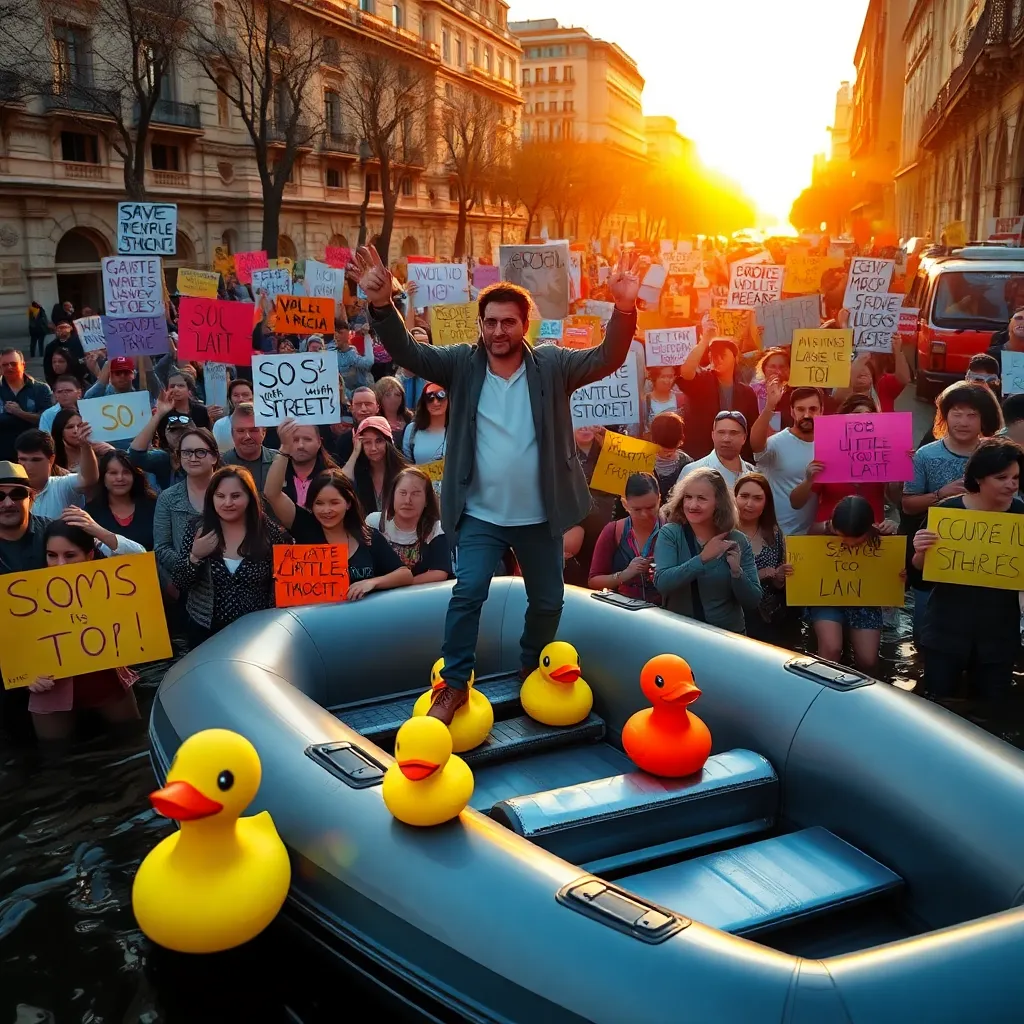Valencia’s Drenched Dilemma
Valencia, Spain
In the aftermath of catastrophic floods that claimed over 200 lives last month, residents of Valencia are taking to the streets in droves, demanding the resignation of the region’s head, who they accuse of woeful mismanagement in the face of disaster. The protests have quickly turned Valencia into a boiling cauldron of frustration, where angry citizens wield signs that read “S.O.S - Save Our Streets” and “Too Little, Too Late!”
The floods, which wreaked havoc on the city, left many areas submerged and communities devastated. Eyewitness accounts from the floods paint a picture of chaos: “I saw a man floating down the street on a car hood, waving to the rescue boats like he was on a holiday cruise,” recounted local resident Marta González. “But instead of lifeguards, we had politicians – and they were nowhere to be seen!”
The Call for Accountability
As the waters recede, the call for accountability has only intensified. Protesters argue that the regional head, known affectionately (or perhaps derisively) as “Captain Raincoat,” failed to act decisively when the storm warnings were issued. Many feel that had there been a proper response, the tragic loss of life could have been mitigated.
“It’s not just about the floods; it’s about how we were left to fend for ourselves,” said protest leader Javier Ruiz, brandishing an inflatable life raft as a makeshift throne. “We need leaders who can swim, not just ones who can wear fancy jackets!”
The protesters have taken their grievances to the streets of Valencia, with their chants echoing through the city. Some even resorted to creative demonstrations, such as organizing a mock boat race in the town square – complete with rubber ducks and a pirate flag hoisted high. “If I can’t float my way to safety, at least I can float my way to a good meme!” one participant quipped.
The Response from Authorities
In response to the uproar, the regional head has attempted to calm the storm with a series of press conferences that have done little to quell public outrage. “We are dedicated to investigating the situation,” he stated, clutching his umbrella like a life preserver. “We will get to the bottom of this, just as soon as we dry off!”
However, the public remains skeptical. “His idea of getting to the bottom of things is probably just checking the bottom of his wellies,” scoffed local artist Lucia Martinez, who has taken to social media to document the protests through a series of satirical cartoons.
An Honest Conversation?
Meanwhile, as tensions rise in Valencia, a surprising voice has emerged from across the sea: Bryan Lanza, who recently suggested in an interview with the BBC that there needs to be an “honest conversation” regarding international issues, including a rather tepid take on Crimea. While his comments were not directly related to Valencia, they drew parallels between the need for open dialogue and the necessity for accountability at home. “If only our leaders could communicate as openly as that!” sighed one protestor, drowning his sorrows in a soggy churro.
The Road Ahead
As protests continue and the waters of discontent rise, it’s clear that the people of Valencia are not going to let this issue sink without a trace. With demands for transparency and accountability echoing through the city, the regional government faces increasing pressure to respond to the needs of its constituents – or risk being swept away in the tide of public opinion.
Yet, amidst the chaos, the spirit of resilience shines through. Local businesses have begun selling “Flood Survivor” merchandise, and the city’s artists are collaborating on a wall mural to commemorate the victims of the floods while also calling for change. “Art is our lifeboat!” said Martinez. “If we can’t change the tide, we’ll at least color it!”
As Valencia grapples with both its recovery and its leadership, one thing is certain: the heart of this city beats strong, and the voices of its people will not be drowned out. The water may have receded, but the call for justice is just beginning to rise.
Conclusion
In the end, Valencia’s saga serves as a reminder that leadership isn’t just about wearing a raincoat; it’s about being in the trenches – or the floodwaters, as it were – and ensuring that no one is left to float alone. As the protesters chant for accountability, they are not just demanding change; they are demanding respect, dignity, and the promise that their voices will be heard above the roar of the storm.
“We will rise, just as the waters did,” vowed Ruiz. “And next time, we’ll make sure our leaders are paddling in the same direction as the rest of us!”
